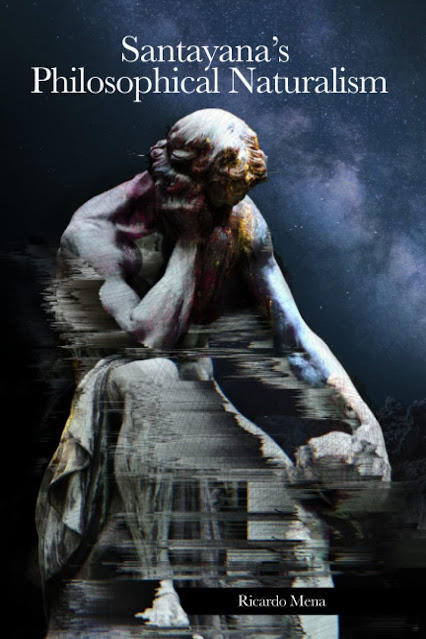SPN §3
 |
Key Ideas
—Pantheism is adoring blind power (Paragraph 1).
—Nature has no plan nor Providence for Spinoza
and all pantheists (Paragraph 1).
—Religion is adoration of power. John Donne
(Paragraph 2).
—Santayana and imagination (Paragraph 3).
—Relativity in morals is not nihilism in morals
(Paragraph 4).
—USA controlled by capitalism, selling
commodities and making money.
Democracy enslaved by capitalism
(Paragraph 5).
—Japanese ‘karoshi’ and duty in Kant
(Paragraph 6).
—Christianity is a philosophy. Cynics, Socrates
(Paragraph 7).
—Suffering for Christian Philosophy
(Paragraph 8, 9 & 10).
The third thought reads:
§3 For Spinoza has no God, properly so called; the
world is not moral, and prescribes no particular form
of being rather than another to itself; it is on the contrary
absolutely infinite, and requires that every possible
thing, an infinity of absolutely infinite spheres
of being, should coexist. This monstrous universe rejects
nothing; but it condemns nothing, and therefore,
being non-moral, does not give the lie to our own
moral standards, although it is indifferent to them.
Nature for Spinoza produces without criticism what
she must produce, and actually produces all imaginable
things. Our standards of what ought to be are indeed
relative to our nature and needs, but we have a
perfect right to treat them as absolute,
And here I added a footnote:
This is a key thought in Santayana’s ethical vision, and we
will see it again and again in other versions.
Thought §3 goes on:
since there is no other nature or needs with higher authority or
prior claims. In the moral world our standards hold
universally, and any crime against them cannot appeal
for justification to a standard and purpose above
our own. There is no such purpose. Nature has no
plan, it attributes no worth to anything; as Spinoza
puts it, God cannot love any man. Spinoza’s system is
grim, oppressive, overwhelming; but it is not positively
immoral. Its severity has elemental grandeur;
it abstracts from human desire.
1. What else can we say about the above. Let’s see. First of all, the idea that pantheism is God considered as power, but as divine blind power, with no telos, no purpose, no Providence. Spinoza’s God-Nature is pure force, matter in motion, action, energy, physics turned morals, as Santayana will say years later in another selected thought included in SPN. God for Spinoza has no plan for humankind. Pantheism adores power, as Christians do.
2. I remember now what John Donne said about religion. That it started in fear, in trembling, in feeling death near you at all times before that divine power which is the Deity for Donne. Spinoza feels the same elation and fear before this cosmic power that surrounds us. Santayana feels this power too, he is pious when recognising that this power is over us, that it made us, but he does not adore it for its powerfulness, which is a religious idea. Santayana does not love power, but goodness. The good that comes from this power: poetry, art, music, imagination. Imagination is another key idea in Santayana.
3. Imagination is not faith in so far as it is enjoying poetry and religious tales while not falling in the deception that they are history or scientific knowledge. Religion is believing in tales, in poetry, deceiving us that it is not imagination but knowledge. When Santayana writes that imagination is the great unifier of humanity, as he will write in 1900, he is defending more poetry, more contemplation, less work, less production, less capitalism. The ideal society of Santayana is one in which people work enough to devote the rest of the day to think, to talk, to write, to create art and use their imagination. It is an Epicurean ideal.
4. When Santayana says that morality is relative to us, he is just stating an obvious fact: you like your kind of life, as I do mine. Why must we fight if we are different? Toleration is one aspect of relativity in morals, which is based on respect and is not caused by weakness (the argument of religious, intolerant people) nor indifference. Strangely enough, Santayana will write against democracy and its freedom of expression and toleration on the reason that they are the products of indifference not respect, as everything of value is already determined by publicity, political parties, and public morality.
5. In the USA, where Santayana lived the first 40 years of his life, the philosopher saw a society enslaved by business and making money, leaving no peace of mind nor free time to do some contemplation, some thinking, creating something artistic. The citizen is just one part of the machine. He has no nobility of mind. The citizen in the USA is not working to live, but living to work.
6. In Japan, as I recall now, there is one problem called ‘karoshi’, a term applied to the fact that one dies by overwork. I cannot imagine how can this happen in a free society, but Japan’s culture is full of that sense of duty that is what the philosophy of Kant preaches. You have to live as your duty says, not as you like to live. For Kant, happiness is unworthy of being considered in ethics, as it means for him not a rule of universal scope, but only an egoist, particular way of ruling your life. I think capitalism fits with Kant’s philosophy of morality, of duty. ‘Work, produce, do your duty!’ I put a link to the ‘karoshi’ thing in HERE. For an Epicurean, the Kantian morality creates an enormous amount of suffering. And suffering, for an Epicurean living after Darwin, is the definition of evil. It is the Satanic thing.
7. Christians have a way of coping with suffering that demands a commentary. First of all, Christianity is a philosophy, not something created out of nothing and given us by a divinity, as some people I have talked with seems to think. Christianity is just another philosophy and as such integrates the list of world philosophies together with Stoicism, Platonism, Epicureanism, Cynicism. In fact, now that Cynicism has appeared, I remember that the first Hellenised Jews that ended up writing the Gospels, conceived their Jesus of Nazareth as a Cynic: have no property, travel with only the necessary, denounce evils of society, live in poverty, etc. This is the kind of ideal life that Socrates preached too: when he is addressing his Judges before being condemned, Socrates says that he was born with a divine gift: denounce the evils of the Athenian society. Socrates dies like a Cynic martyr, just like the inventor of Jesus of Nazareth, later on called ‘Mark’, will show in his story of the Passion. Mark’s Jesus of Nazareth died for the sins of his society, the Israel one, not the world’s. In here, one should recommend the reading of Earl Doherty’s great book on the question: Jesus: Neither God nor Man. The Case for a Mythical Jesus (Ottawa, Canada: Age of Reason Publications, 1999).
8. I forgot where I was. Suffering as Christianity sees it. Good. What does Christianity say about suffering. This question is seen from the perspective that this philosophy believes that a perfectly good God has created our universe, so that suffering and evil in the world is not the result of blind nature and competition for natural resources, but a problem. As such is cataloged for them: the problem of evil. And it is a ‘problem’ for the reason that a perfectly good God cannot be responsible for the evil contained in His divinely-created universe. How do they exonerate their perfectly good God? They say that evil is not caused by God, but by our freedom to act. The question is put like this: evil is part of the price to pay for our freedom, or in mythical terms: evil is caused by us when we disobeyed God in the Garden of Eden. They do not discuss that God knew before creating His universe that there will be an unbelievable amount of suffering as a result of His action, but He went ahead all the same. Being is divine, and evil is not evil, but the lack of good. Something like this has been imagined by theologians, in order to avoid the existence of evil, as it put too much pressure on God’s goodness. If the universe is not governed by a good Providence that justifies all evil means as a way to obtain a good end, then Christianity is doomed to fail as a correct philosophy. Evil for them, then, must be discounted, denied, ascribed to someone else’s shoulders (us and our original sin), etc. As a lawyer by profession, I think God will be considered responsible by any competent Judge or Jury. If He is the boss, he is considered liable for the results of His creation and his creatures’ behaviours.
9. To start with, this God has created us to be selfish, to fight for a territory, to kill other animals to eat. He could have created us to have substance in the air, but He considered that meat was better and carnage is no bad thing after all when you consider the glorious final outcome that lies ahead. In here, Christians are like German Idealists (Hegelians, rather than Kantians). The World Spirit develops and one now adores becoming instead of being. Saint Thomas Aquinas out, Hegel in.
10. In Santayana one never forgets human decency and sense of justice, so that suffering can be understood post facto, but is never condoned while it is happening. Suffering is evil, for an Epicurean and naturalist philosopher. Only a fool, or someone defending a God of his own image can be blind to the evil that is suffering. I was talking with a Christian barber the other day. While he was cutting my hair we talked some philosophy. And we ended up talking about evil. For my Christian barber, evil was good; it taught us to be patient, to be firm, to surrender our pride, to learn humility before God. He added to support his thesis, that a terminal cancer was a good thing; that he even heard someone saying that cancer had taught him many good things. I replied: ‘That is not true. You don’t wish other people a good terminal cancer when you say goodbye’.
On and on till the final Dragon...


Comments
Post a Comment